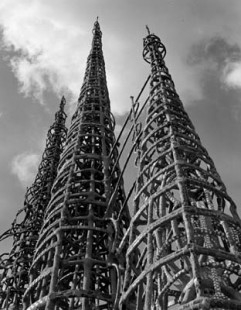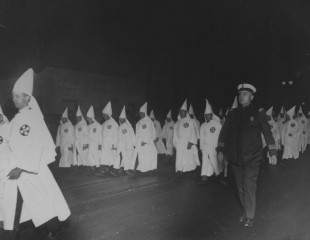Edendale: Chapter 5
The Fifth Chapter Of The Novel “Edendale,” THE STORE ON HYPERION, by Phyl M. Noir
Watts Towers, photo courtesy of Los Angeles Public Library
The KKK marches in Los Angeles. Photo courtesy Los Angeles Public Library
By PHYL M. NOIR
Max came to the house in the Avenues. He was gaunt, and he mumbled and smelled like booze. Sam looked up from watching the ball game on television and said, “What’s the matter with you?”
Max walked into the kitchen. He opened the refrigerator and took out a carton of milk and drank all the milk up.
Sam saw him out of the corner of his eye and almost jumped out of his chair and said, “Hey, hey. What’s the matter with you? Get out. Don’t come back.” He never spoke to Max after that.
Sometimes, until Bernie died from a heart attack when he was sixty years old, Bernie asked what had happened, and Sam always said, “Max went into the kitchen and drank up all the milk.”
That year, Sam moved “Griffith Park Cleaners ““ a fine French dry cleaner’s” from the round tower with the crenellated roof on Griffith Park Boulevard to a former grocery store on Hyperion Avenue across from the old Walt Disney studio.
Behind the store had stood a furnace to heat the pressing machine. It shuddered and belched: a hellish device. Fire beat at the metal sides of the furnace trying to get out. A steep road or driveway went up past one end of the store, and next to it stood the Hyperion Station, a tiny public library that was to become a pet food store the following year.
Bill had a barber’s shop in the other end of the building, and an electric barber pole whirled in two spiral ribbons representing two long bandages, one twisted around the arm before bleeding, and the other to bind it afterward. People said, “Bill the Barber,” as if the barber were Bill’s last name.
Bill hired an assistant in 1955, and he renamed the store “The Uranium,” and placed copies of Harvey Krutzman’s Mad magazine and the horror comic Tales from the Crypt on the ledge. In 1990, the store would become part of an optometrist’s office, and the gas station on the corner built a smog testing shed into the hill.
Bill the Barber slept under a newspaper over his face on his one barbering chair. When he woke up, small boys replaced him one by one in the chair and he buzzed their hair as flat as airplane landing fields for flat tops and for other boys he left a little more hair for high and tight and clipped hair into an even shorter crew cut.
Fathers and sons from the neighborhood gathered in the barber shop and listened to a broadcaster talk through a baseball game. “Listen to that!” they said and applauded. Men like Sam Garfield who had been foot soldiers in the army still wore their hair long on top and short on the sides, slicked back with Vaseline.
Chevrolets, Pontiacs and Fords passed the barber’s windows, and the heavily chromed automobiles had interiors like living rooms. No one in Edendale had a Buick until a family moved there from Texas. The Buick’s grille was monster’s teeth; the engine had holes on the side of the chassis as if it needed them to breathe with. Edendale men said to each other, “I guess it’s all right. They’re from Texas.” Someone drove an Edsel past the barber’s windows once. The older boys shook their heads and laughed lewdly.
Sam didn’t see what was funny about the Edsel but he laughed anyway out of a sense of companionship with the others.
Those were Sam’s fat years. He was fat for about five years from eating chocolate cake with a glass of milk after dinner.
He wore white short sleeved shirts with the words “Griffith Park Cleaners” embroidered over the pocket and a black bow tie and black slacks with a thin black belt and black shoes. His slicked back hair slimed the back cushions of his wife’s upholstered furniture.
Mary Kappas from Smyrna, Turkey, sat at the sewing machine in the Griffith Park Cleaners. Above her and to her left hung a wood board with spindles and on each of the spindles were wooden spools of black, white and colored thread. The black and white spools were the biggest.
Jesse Brown — who was brown and who wore brown trousers, a pearl white shirt and a white undershirt — worked the pressing machine. He had a little brown caterpillar mustache.
Every day at five o’clock Jesse washed up with Lava soap in the bathroom, dried his hands on the cloth towel, and put the brown porkpie hat on his kinky brown hair, curving the brim tenderly between his fingers, and he went out to the street to wait for the bus that took almost two hours to reach his house in Watts.
Sam and Cyd’s mother Justine had taken her to Jessie’s house when she was three. They drove in the indomnitable Pontiac with the Chief Pontiac hood ornament staring past the one story stores that used to be everywhere in Los Angeles: a drug store, a five and dime, a shoe store, a jeweler’s, a candy store, a movie theater with a marquee.
A men’s haberdashery looked the same as a store on Fletcher Drive near their house but the mannequins in the Watts store windows wore mustaches, and they had brown skins.
The family stopped for a few minutes to see the Watts Towers, which were tall armatures decorated with tools, bottles, found tiles and sea shells.
Sam parked the Pontiac on Central Avenue and went into a See’s candy store. On the door to the candy store was a drawing of an old white woman and under her were the words: Candy, the healthy habit.
He came out of the store with a white bag, and in the bag were chocolate turtles to give to Jesse’s wife as a present. Chocolate turtles were dark chocolate poured over walnuts.
He looked up and saw men that wore cotton robes over their street clothes and pointy white hats like dunce caps that had material in the back covering their shoulders drive down Central Avenue honking their horns. He remembered Mittle-brau in 1945.
Sam drove down a street of small houses painted white with green lawns and white picket fences.
Jessie’s wife came out of one of the houses. Her skin was blue black. She had been to a beauty salon where the cosmetologist designed her hair in elaborate coils that shone bronze in the afternoon light.
They all sat at a card table with a white starched cloth over it under an avocado tree in the backyard. Jessie’s teenage boy quietly sat with them but he didn’t say anything. His mother said he was slow. He had been born too early and didn’t know how to talk.
Jessie’s wife placed dainty white coffee cups on saucers, spoons and cloth napkins on the table and poured coffee into the cups from a porcelain jug. Justine raised her cup and curved her pinky finger elegantly as she drank.
The men in the dunce caps and white robes stopped their cars across the street. They had turned their caps around so that the fabric that had hung on their shoulders now covered their faces, and all you could see were their eyes.
The men got out of the cars and together put a wooden cross maybe ten feet high in a neighbor’s yard and poured gasoline on it from a gas can and set it on fire. Sam and Justine decided to leave right then, and Jessie said he was sorry Mr. Garfield but of course Jessie had not done anything.
On Saturday afternoons, when she got older, Cyd bicycled down into the river and up the other side past the Mulholland Fountain that the city lit with changing colored lights at night to the Griffith Park Cleaners and took over the front counter for Sam so he could deliver clean clothes to customers and take soiled clothes down to the plant on Riverside Drive, which was owned by Chinese people.
She added up cleaning, laundry and tailoring charges on a receipt pad with purple carbon paper underpinning so she could keep a record for Sam’s taxes.
Mary Kappas couldn’t write out the charges because she couldn’t write in English. Mary had grown up under the Ottoman Turks and couldn’t write the Latin alphabet — although how she got a driver’s license no one but Mary knew.
Cyd asked why Jesse Brown couldn’t write up the receipts, and Sam said, “Because Jesse’s from Mississippi. They didn’t let Negro men learn to read and write in Mississippi.”
That was the worst thing she had ever heard. It was as if white people had cut into Jesse’s brain and removed parts of it.
She looked past Sam to the paper poster hung on the wall. The poster was a drawing of a tailor sitting cross-legged and sewing a garment. Beneath the tailor, words read, “A stitch in time saves nine.”
At first, she had thought the words meant there was a stitch in time, and you could have nine of them. She thought about the universe, and the folds in it which must be called “a stitch,” through which time flowed. You could go backwards and forwards in time if you were in the stitch, which felt rather like being a hand inside a sleeve.
After awhile, she understood the words were only a proverb and they meant that you prevent injury by taking care of things now.
Sam didn’t often notice her but she was crying so he said, “It’s going to be all right. Jessie’s wife is a school teacher. She’s teaching him to read.”
After she grew up the people in Watts burned down the stores near their houses. The owners left Watts and didn’t come back. The state built freeways through South Central, and then people moved away if they could.





